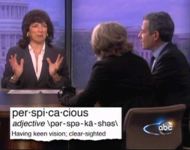Word Routes
Exploring the pathways of our lexicon
High-Definition TV: Do Viewers Need Pop-Up Vocab Assistance?

If you were watching "This Week with Christiane Amanpour" on ABC Sunday morning, you saw a high-minded historical discussion of the U.S. Constitution. But you also might have caught an unusual media moment, when Amanpour, responding to Harvard University professor Jill Lepore, commented that Ben Franklin "was amazingly perspicacious when this Constitution was signed." As Amanpour spoke, a graphic popped up on the screen giving a dictionary definition for the word perspicacious.
Matt Schneider of Mediaite took notice and helpfully provided the relevant clip:
Schneider called the use of the vocab graphic "either unintentionally hilarious or merely bizarre." "Were producers worried that the word would fly so far over their audience's head that they needed to intervene as a public service?" he wondered. "Is This Week now like Pop-Up Video with explanatory details and interesting facts popping up to complement what's happening on screen?"
I agree that this one-time use of "pop-up vocab" on the show was peculiar, particularly if you take a look at the verbiage elsewhere in the program. I ran the show transcript through VocabGrabber, and perspicacious was hardly the only SAT-level word used. Michael Eric Dyson of Georgetown University spoke of lacunas in the Constitution, with women and people of color being elided and "seen as marginalia." Dyson warned of thinking that the current generation "is somehow vulnerable to rebuff of the Constitution" or that "the apotheosis of history finds its resting point in you." Elsewhere Dyson noted that Thomas Jefferson didn't want changes made to the Declaration of Independence, but "redactors prevailed."
Roundtable panelist George Will, no slouch in the vocabulary department, opined that for many Americans "the somewhat promiscuous expansion of government power in recent years raises questions about whether we still have a government of limited, delegated and enumerated powers." Things got downright philosophical when Lepore threw out epistemological, and Dyson referred to a "Hegelian problem." (That went over the head of the ABC transcriber, who rendered it as a "Hagelian problem," perhaps confusing German philosopher Georg Wilhelm Friedrich Hegel with former Nebraska Senator Chuck Hagel.)
So why did Amanpour's perspicacious get singled out for pop-up treatment? Perhaps the producers figured viewers' eyes would glaze over at the erudition of the panelists, but the show's host ought to receive special clarification for anyone stymied by her use of a potentially unfamiliar word. Or perhaps this was simply a trial balloon for their pop-up vocab technology, and we'll be seeing more and more of these visual aids on the program in the future.
Would this type of on-screen assistance, if provided more systematically, be a good thing? It would save the folks at home the trouble of pausing the show and running to the dictionary — a quaint idea, in this day and age, I know (though perhaps not implausible for an audience regularly exposed to the likes of George Will). Ideally, of course, definitions would only be served up as requested by the consumer — in the manner of the online New York Times allowing readers to access a reference search by double-clicking on any word in an article. When it comes to TV news broadcasts, one could imagine a day when iPads or other multitouch devices could offer the same type of interactivity.
Until that day, however, "pushing" dictionary definitions on viewers via pop-ups may not be such a wise move. It's distracting, and it could be perceived as condescending. It's especially ironic that the glossed word was perspicacious ("acutely insightful"), as if to say, "If only you were a little more perspicacious, you wouldn't need an extra vocabulary boost!" But that's just my take on it. Let us know in the comments below if you think Pop-Up Vocab is a welcome development or an unnecessary intrusion.


